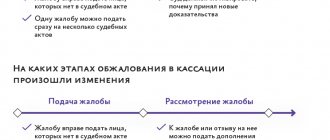If, after the first cassation, you do not agree with the decision of the regional court, then take the chance to protect your interests in the highest judicial body of Russia - the Supreme Court. This court is the second cassation instance, which considers complaints in civil cases of all constituent entities of the Russian Federation. For this purpose, civil procedural legislation establishes a certain appeal procedure, filing deadlines and requirements for the content of a cassation appeal.
In this article, we share our experience of appealing to the Supreme Court and provide proven legal advice: how to file a complaint; what to write in the cassation; what are the deadlines for submission? chances of winning the lawsuit. As well as a detailed action plan for the course of the trial in the RF Armed Forces.
Where to file a complaint after the first cassation
So, according to the new reforms in the Code of Civil Procedure of the Russian Federation, the cassation appeal procedure in our country takes place in two stages. The first stage is the filing and consideration of a complaint in a cassation court of general jurisdiction of a regional subject of the Russian Federation. After the first cassation, the second stage follows - an appeal to the Supreme Court, the same for all subjects of the Russian Federation. We note that the complaint is being filed with the Judicial Collegium for Civil Cases of the Supreme Court. The application procedure at this stage is much simpler, since you submit all documents directly to the court, in a convenient way (electronically, in person or by mail).
Please note that in accordance with the norms of the Code of Civil Procedure, the Supreme Court, in the cassation procedure, checks the legality of previously adopted court decisions, in contrast to the appeal, where you can also refer to the unfoundedness of the judges' decisions.
Legal assistance in appealing to the Supreme Court
Consultation in the office and by phone
+7(495) 728-99-14
Help from a lawyer. 18 years of experience in appealing to the Supreme Court!
We are working during the quarantine period of 2021! Call.
Prices for the services of a lawyer in criminal cases
| Appealing a court verdict (one instance) | from 25,000 rub. |
| Consultation with a lawyer by phone, Skype, Telegram, WatsApp. (Consultation is provided only by a lawyer from the MMCA forensic department) | Emergency consultation free of charge |
| Protection at the preliminary verification stage | from 23,000 rub. |
| Defense during the preliminary investigation | from 42,000 rub. |
| Defense during judicial arrest | from 15,000 rub. |
| Defense in criminal court of first instance | from 35,000 rub. |
| Appeal to the European Court (ECHR) for violations by the national authorities of the Russian Federation | from 40,000 rub. |
| Defense in jury trial | from 40,000 rub./month |
| Defense in cases of theft and fraud | from 56,000 rub. |
| Defense in corruption cases | from 120,000 rub. |
| Defense in economic and tax cases | from 100,000 rub. |
| Defense in cases of road accidents | from 42,000 rub. |
| Drug defense | from 35,000 rub. |
| Defense in the World Court in cases of minor and medium gravity | from 27,000 rub. |
| Defense in cases of especially serious charges, as well as cases under investigation by the Investigative Directorate of the FSB of the Russian Federation (IC of the Russian Federation, SD of the Ministry of Internal Affairs) | from 150,000 rub. |
Deadlines for filing with the Supreme Court after cassation
The deadline for filing a complaint with the Supreme Court starts immediately after the first cassation, that is, from the day the act is announced by the cassation court of your region. The deadlines are fixed in the Civil Procedure Code and amount to 3 months, beyond which an appeal is impossible, without compelling reasons for missing the period for filing a cassation with the Supreme Court.
However, in our experience, the Chairman of the Supreme Court can accept your complaint for consideration if the reason why the deadline was missed was valid (including illness, long business trip, caring for relatives). To do this, you will only need to submit the appropriate petition along with the main package of materials submitted to the Supreme Court.
We advise, after the cassation, not to delay the appeal, since this time is better spent preparing a legally competent complaint to the Supreme Court, and thereby increase the chance of winning the trial.
Cassation appeal: what is it and what is its purpose?
The cassation procedure requires the filing of a complaint. She must appeal the court ruling, which has entered into force. Provided that this is not a Supreme Court ruling. The main task of the direction under consideration is that this court decision be challenged on the basis of mistakes made.
For example, if these errors were made during the proceedings, and ultimately had a negative impact on the decision made. And if, without correcting the errors in question, it is impossible to achieve a fair resolution of the dispute, protect the interests of the person and eliminate other problems.
What is the difference between cassation in the Supreme Court?
The differences between the cassation appeal to the Supreme Court and the previous complaint are due to the specifics of the judicial proceedings in the Supreme Court. The main task of the highest judicial body is to correct law enforcement practice and form a unified position, namely to eliminate gaps in legal understanding.
Since after cassation the Supreme Court is the final authority for appealing judicial acts, the appeal procedure is possible only after a preliminary verification of your cassation appeal. The check is carried out by the filter judge for compliance with the conditions imposed by the Code of Civil Procedure, not only for the format and content of the application, but also for the position of the applicant. Based on the results of which you receive a notification about the acceptance of the cassation or its rejection.
Unlike the first cassation, your appeal to the Supreme Court demanding a review of the case should be radically different in motivation, justification, emphasis and structure of presentation of the cassation appeal. In other words, it is not enough to simply duplicate the text of the first cassation appeal for the Supreme Court.
We remind you. At this stage, the panel will only check the errors of the lower courts, and therefore you do not need to set out the circumstances of the case.
You cannot justify your position by evaluating the evidence. The main task at this stage is for the board to decide to request all case materials from the archive, since after they are requested, the likelihood of inviting you to cassation is highest.
How to write a complaint to the Supreme Court (second cassation)
After cassation, without complying with formal requirements, it is impossible to initiate an appeal procedure in the Supreme Court. Therefore, before submitting documents to the Supreme Court, you need to carefully study the criteria for them. Other requests not provided for by procedural legislation should not be contained in the basis of the cassation appeal.
As follows from the articles of the Code of Civil Procedure, the complaint (second cassation) must contain:
- Information about the court considering the appeal (division of the Supreme Court, address)
- Your data and procedural status (full name, address, applicant - defendant or plaintiff)
- Data of other participants in the case (your representatives - a lawyer or lawyer, the other party to the dispute - the plaintiff or defendant, third parties)
- The subject of the dispute, information about the act being appealed and other decisions and determinations adopted in the case.
- Grounds for appeal. In this part of the cassation it is necessary to indicate what the violations are and provide arguments confirming the applicant’s position, i.e. yours. Based on our experience in appeals to the Supreme Court, we recommend that you indicate the sheet numbers of archival materials; it is not recommended to attach copies, since in this case the case will not be retrieved from the archive. We also note that such a characteristic as materiality is evaluative, depends on the judicial discretion and is established in relation to each specific dispute.
- Indications of legal norms and laws that confirm the presence of violations committed in court decisions, appeals or after the first cassation.
- Your requirements are stated at the end of the cassation appeal to the Supreme Court. We will clarify that since the competence of judges at this stage is limited, it is impossible to ask for a re-evaluation of evidence and circumstances.
- Application documents.
Note. You can ask for a new decision or a new trial depending on whether there is a need for further examination of the evidence and re-evaluation of the available data.
Plan of cassation appeal to the Supreme Court
After cassation, the appeal to the civil division of the Supreme Court is progressing according to plan:
Step 1 . Prepare a new cassation appeal and attachments to it. The package of documents will depend on the submission method you choose. There are various ways to contact the Supreme Court. For example, through the website of the Supreme Court supporting the electronic filing service. In this case, you will only need to fill out the registration data on the State Services portal, fill out the proposed form and attach a scan of the cassation and receipt of payment of the state duty. From our experience, we believe that the advantage of the electronic method of filing documents is that there is no need to attach numerous copies of acts of lower authorities. You can also submit a package of documents in the classic way: in person or by mail.
What else do you need to attach to the original complaint to the Supreme Court:
- Its copies according to the number of persons participating in the case.
- Certified copies of the acts being appealed (confirmation of sending to persons is not required). We would like to remind you that the cassation rulings, appellate decisions, and court decisions you enclose must contain the blue stamps of the court that made these decisions.
- Receipt of payment of the state duty (the amount for individuals is 150 rubles. If you are exempt from paying the state duty in other authorities, when submitting an application at this stage you also do not pay the fee).
- Power of attorney for a representative (if he is involved in filing a cassation appeal to the Supreme Court).
STEP 2. Wait for the results of the initial review of the complaint by the filter judge. Depending on the method chosen, you will receive a notification in writing (by mail) or electronically (the status of your application will change from “received by the court” to “accepted for proceedings” in your personal account)
STEP 3 . If the cassation is accepted, a date will be set for consideration of the dispute in the Supreme Court. In our experience, the dispute will be resolved within two or three months (depending on whether the case was requested from the archive).
Important. The Convention for the Protection of Human Rights and Fundamental Freedoms gives you the right to file a supplement to your appeal.
Consultation on appeal to the Supreme Court
+7(495) 728-99-14
Preparation of cassation appeals in the RF Armed Forces. Appeal to the Supreme Court. Lawyer for complaints to the Supreme Court.
Moral injury
The Plenum emphasizes: when determining the amount of compensation for moral damage, courts must take into account several factors:
the nature of the physical or moral suffering caused to the victim, associated with his individual characteristics;
the degree of guilt of the defendant, his financial situation;
other specific circumstances of the case influencing the court's decision on the claim.
In all cases, when determining the amount of compensation for moral damage, the requirements of reasonableness and fairness must be taken into account.
If the court finds signs of illegal or immoral behavior in the actions of the victim, it can take this into account and reduce the amount of compensation for moral damage.
Is it possible to win in the Supreme Court on cassation?
Despite the fact that judicial acts that have entered into legal force provide for the possibility of appeal in a supervisory procedure, there are special strict grounds for review. Not every case can be considered in cassation by the Presidium of the Supreme Court (in practice, 0.1% of applications are considered in this manner)
Thus, a second cassation review is your last chance to get controversial court decisions overturned and restore violated rights on substantive and procedural grounds, since most often a refusal ruling is issued, which is associated with incorrect reasoning of the request.
The second factor determining the need for a legally competent drafting of a cassation appeal is that in order to take advantage of further international protection (ECHR), it is necessary to exhaust all domestic remedies, therefore it is necessary to draw up a document that will not only contain all the necessary information, but also will seem sufficiently motivated to the filter judge to be considered by the RF Supreme Court.
The filter judge of the Supreme Court may refuse to transfer a cassation that does not meet the requirements of the Code of Civil Procedure, therefore it is necessary to draw up this procedural document competently and taking into account the peculiarities of the process and the instance.
Lock fees
The Supreme Court emphasizes that defendants must compensate for damages not only to the property that is specified in the charge. You should also take into account damage to alarm or video surveillance devices, lock picking, damage to a door or window when entering a room, damage to a car for the purpose of stealing it. In general, you will have to pay for all actions that were part of the method of committing the crime.
If the damage caused by the crime was insured, then the defendant must reimburse only that part of the plaintiff’s expenses that the insurance company did not cover.





